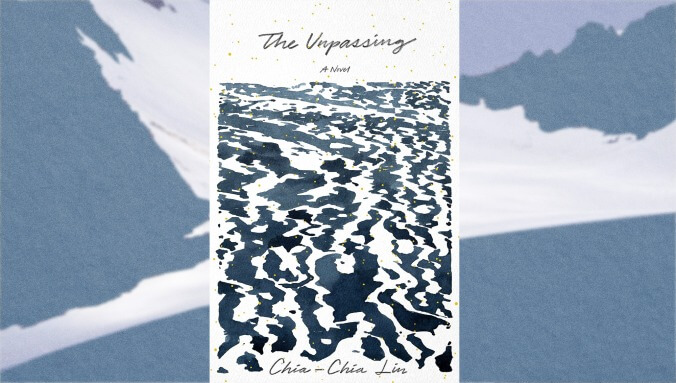Tragedy strikes an immigrant family in the bleak and beautiful The Unpassing

There’s a hothouse isolation pervading Chia-Chia Lin’s debut novel that’s evocative of Jeffrey Eugenides’ much-lauded 1993 debut, The Virgin Suicides. But instead of a white family in a declining Detroit suburb, The Unpassing centers a Taiwanese immigrant family in the remote wilderness of Alaska, 20 miles outside Anchorage. The destruction that runs through the family is, as in The Virgin Suicides, partly a destruction without a name. The children—the oldest a daughter, Pei-Pei; 11-year-old Gavin, who narrates the novel; 5-year-old Natty; and 4-year-old Ruby—are a world unto themselves. They are rapt by the tragic failed launch of the Challenger and crew member Christa McAuliffe. They “fight to claim first discovery of the briefest snippets,” before piling onto each other “heaving in sync, our six legs and six arms twisted together like a boneless creature at the bottom of a sea.”
The Unpassing begins with another death: Early in the novel, Gavin wakes up after feeling ill, and finds out he has survived meningitis, but Ruby contracted it, too, and died. The blow of the loss creates heartbreaking trajectories for each of the characters, but perhaps most of all for Natty, who cannot understand death in a way the rest of his family can. Natty goes searching for his sister in the woods, once a site of reprieve from the oppression of the house, after his mother tells him she is simply “lost.” Gavin tells him, finally, that Ruby’s dead, and Natty replies, “You were dead too. I saw it. But then you came back. You came back without her.” In the cruelty of the accusation, Gavin tells Natty that Ruby’s just “dead animal dirt.”
What The Unpassing does is so brutal yet intensely immersive that questioning Lin’s choices feels like asking for a novel far less authentic. Gavin, because of his age, creates giant gaps of knowledge for the reader, which need to be filled in by Pei-Pei, the cynic who knows precisely what’s going on and the one the reader trusts. A haphazard, childish grief engulfs Natty, who clings to fantastical and horrific notions. In every sense of the word, The Unpassing is far more bleak than The Virgin Suicides, primarily because of the narrative closeness to the devastation, something Eugenides elided using multiple narrators outside the family who ultimately knew too little.
It’s brutal, but marvelous. The prose is so sparse that it feels designed to describe Alaska, and Alaska alone. “Time changed texture quickly in the summer,” says Gavin, simply. To solve the mystery of a noise, perhaps mice, coming from the ceiling, the father, a plumber, takes it apart, and spruce cones, dust, and insulation fall out along with tiny skulls. When he abandons the project, the mother screams, “Finish this one thing in your life!” before using a radio and antifreeze to kill whatever is making the infernal sounds. Over and over, the father and mother push and pull, projecting their discontent with each other onto all sorts of quotidian tasks, the father retreating into his own grief. He is sued for (ostensibly) incorrectly installing a water well, leading to a boy becoming severely ill, and punished with an unspeakably large fine. The driver of human conflict in the novel melts in with Alaska itself: a dying lynx in the woods, for instance, that lies “on its side against the rotted remnant of a trunk, swiping at air with one massive paw as though fighting off ghosts.”
Key to Lin’s work is its omnipresent poverty, but it’s not something she gawks at. The mother collects firewood for no discernible purpose, sneaks away free food, and withholds it. When the family begins to live in their car, in trailer parks, in visitors’ centers, Gavin thinks, “But even with our view cut off, it was impossible to erase the feeling of the unoccupied parking spaces around us. So many freshly painted rectangles and no cars.” That fear of being found is how Lin approaches poverty for the most part: obliquely. Race, too. When the father offers liquor to a guest, the guest says, “Fuck me. What is this, Chinese Drano?”
It’s an arresting approach. Lin does not dwell; she lingers—her lingering a sort of haunting. Innocuous things—dinner at a friend’s house, for instance—become threatening as Gavin tries hard to hide his family’s plight. What ends up happening is as bleak as can be, but also a reprieve, merely because not everything explodes. Which is to say that Lin takes full advantage of the sheer scale of Alaska and the immigrant family’s isolation. Lost in the woods, Gavin observes a burning vision in the sky. “Was this how it had looked when the Challenger exploded?” he wonders. “I was reliving the disaster I had missed—a punishment for sleeping through it all, for having skirted the liquid terror of it.” It’s the most painful of thoughts from a child, because what, after all of this, has Gavin skirted?
Note: The review originally stated that a girl died as a result of the father incorrectly installing a septic tank. We regret the error.